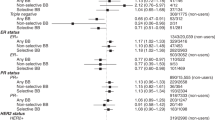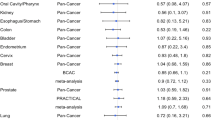Abstract
This retrospective cohort study was aimed to compare the incidence of breast cancer among women aged ≥55 who received calcium channel blockers and angiotensin converting enzyme inhibitors/angiotensin II receptor blockers. We used the 2002–2015 Health and Welfare Database in Taiwan. Women 55 years and older who initiated antihypertensive treatment were included. Breast cancer risk for patients receiving calcium channel blockers was compared to those receiving angiotensin converting enzyme inhibitors/angiotensin II receptor blockers. Cox proportional hazards models were used to generate adjusted hazard ratios for breast cancer. We found that the risk of breast cancer was similar between calcium channel blockers users and angiotensin converting enzyme inhibitors/angiotensin II receptor blockers (adjusted hazard ratio [aHR] and 95% CI = 1.03 [0.80 to 1.34]). No significant risk increase was observed in the stratified analysis by dihydropyridine (aHR = 1.02 [0.78 to 1.33]) and non-dihydropyridine calcium channel blockers (aHR = 1.23 [0.48 to 3.20]). No difference in the risk of breast cancer associated with calcium channel blockers exposure was observed in patients who used hormone replacement therapy (aHR = 1.02 [0.29 to 3.58]). The risk for breast cancer was observed to be significantly lower in patients receiving calcium channel blockers than in those receiving angiotensin converting enzyme inhibitors/angiotensin II receptor blockers at a treatment duration of 5 or more years (aHR = 0.57 [0.33 to 0.98]). In conclusion, the risk for breast cancer is similar for calcium channel blockers and angiotensin converting enzyme inhibitors/angiotensin II receptor blocker users in an Asian population.

This is a preview of subscription content, access via your institution
Access options
Subscribe to this journal
Receive 12 print issues and online access
$259.00 per year
only $21.58 per issue
Buy this article
- Purchase on Springer Link
- Instant access to full article PDF
Prices may be subject to local taxes which are calculated during checkout

Similar content being viewed by others

References
January CT, Wann LS, Calkins H, Chen LY, Cigarroa JE, Cleveland JC Jr, et al. 2019 AHA/ACC/HRS Focused Update of the 2014 AHA/ACC/HRS Guideline for the Management of Patients With Atrial Fibrillation: A Report of the American College of Cardiology/American Heart Association Task Force on Clinical Practice Guidelines and the Heart Rhythm Society in Collaboration With the Society of Thoracic Surgeons. Circulation. 2019;140:e125–e151.
James PA, Oparil S, Carter BL, Cushman WC, Dennison-Himmelfarb C, Handler J, et al. 2014 Evidence-based guideline for the management of high blood pressure in adults: report from the panel members appointed to the Eighth Joint National Committee (JNC 8). JAMA. 2014;311:507–20.
Chiang CE, Wang TD, Ueng KC, Lin TH, Yeh HI, Chen CY, et al. 2015 Guidelines of the Taiwan Society of Cardiology and the Taiwan Hypertension Society for the management of hypertension. J Chin Med Assoc. 2015;78:1–47.
Liu PH, Wang JD. Antihypertensive medication prescription patterns and time trends for newly-diagnosed uncomplicated hypertension patients in Taiwan. BMC Health Serv Res. 2008;8:133.
Taiwan Ministry of Health and Welfare website: Cause of Death Statistics https://www.mohw.gov.tw/np-126-2.html.).
Pahor M, Guralnik JM, Ferrucci L, Corti MC, Salive ME, Cerhan JR, et al. Calcium-channel blockade and incidence of cancer in aged populations. Lancet (Lond, Engl). 1996;348:493–7.
Fitzpatrick AL, Daling JR, Furberg CD, Kronmal RA, Weissfeld JL. Use of calcium channel blockers and breast carcinoma risk in postmenopausal women. Cancer. 1997;80:1438–47.
Li CI, Malone KE, Weiss NS, Boudreau DM, Cushing-Haugen KL, Daling JR. Relation between use of antihypertensive medications and risk of breast carcinoma among women ages 65-79 years. Cancer. 2003;98:1504–13.
Li CI, Daling JR, Tang MT, Haugen KL, Porter PL, Malone KE. Use of antihypertensive medications and breast cancer risk among women aged 55 to 74 years. JAMA Intern Med. 2013;173:1629–37.
Davis S, Mirick DK. Medication use and the risk of breast cancer. Eur J Epidemiol. 2007;22:319–25.
Azoulay L, Soldera S, Yin H, Bouganim N. Use of Calcium Channel Blockers and Risk of Breast Cancer: A Population-based Cohort Study. Epidemiology. 2016;27:594–601.
Raebel MA, Zeng C, Cheetham TC, Smith DH, Feigelson HS, Carroll NM, et al. Risk of Breast Cancer With Long-Term Use of Calcium Channel Blockers or Angiotensin-Converting Enzyme Inhibitors Among Older Women. Am J Epidemiol. 2017;185:264–73.
Chang CH, Chiang CH, Yen CJ, Wu LC, Lin JW, Lai MS. Antihypertensive agents and the risk of breast cancer in women aged 55 years and older: a nested case-control study. J Hypertens. 2016;34:558–66. discussion 566
Leung HW, Hung LL, Chan AL, Mou CH. Long-Term Use of Antihypertensive Agents and Risk of Breast Cancer: A Population-Based Case-Control Study. Cardiol Ther. 2015;4:65–76.
Fryzek JP, Poulsen AH, Lipworth L, Pedersen L, Norgaard M, McLaughlin JK, et al. A cohort study of antihypertensive medication use and breast cancer among Danish women. Breast Cancer Res Treat. 2006;97:231–6.
Gonzalez-Perez A, Ronquist G, Garcia Rodriguez LA. Breast cancer incidence and use of antihypertensive medication in women. Pharmacoepidemiol Drug Saf. 2004;13:581–5.
Lindholm LH, Anderson H, Ekbom T, Hansson L, Lanke J, Dahlöf B, et al. Relation between drug treatment and cancer in hypertensives in the Swedish Trial in Old Patients with Hypertension 2: a 5-year, prospective, randomised, controlled trial. Lancet (Lond, Engl). 2001;358:539–44.
Ray WA. Evaluating medication effects outside of clinical trials: new-user designs. Am J Epidemiol. 2003;158:915–20.
Thakur AA, Wang X, Garcia-Betancourt MM, Forse RA. Calcium channel blockers and the incidence of breast and prostate cancer: A meta-analysis. J Clin Pharm Therapeutics. 2018;43:519–29.
Bangalore S, Kumar S, Kjeldsen SE, Makani H, Grossman E, Wetterslev J, et al. Antihypertensive drugs and risk of cancer: network meta-analyses and trial sequential analyses of 324,168 participants from randomised trials. Lancet Oncol. 2011;12:65–82.
Guo DQ, Zhang H, Tan SJ, Gu YC. Nifedipine promotes the proliferation and migration of breast cancer cells. PloS one. 2014;9:e113649.
Mason RP. Calcium channel blockers, apoptosis and cancer: is there a biologic relationship? J Am Coll Cardiol. 1999;34:1857–66.
Deshmukh RR, Kim S, Elghoul Y, Dou QP. P-Glycoprotein Inhibition Sensitizes Human Breast Cancer Cells to Proteasome Inhibitors. J Cell Biochem. 2017;118:1239–48.
Qaseem A, Lin JS, Mustafa RA, Horwitch CA, Wilt TJ. Screening for Breast Cancer in Average-Risk Women: A Guidance Statement From the American College of Physicians. Ann Intern Med. 2019;170:547–60.
Gomez SL, Yao S, Kushi LH, Kurian AW. Is Breast Cancer in Asian and Asian American Women a Different Disease? J Natl Cancer Inst. 2019;111:1243–4.
Lin CH, Yap YS, Lee KH, Im SA, Naito Y, Yeo W, et al. Contrasting Epidemiology and Clinicopathology of Female Breast Cancer in Asians vs the US Population. J Natl Cancer Inst. 2019;111:1298–306.
Taparra K, Dee EC, Dao D, Patel R, Santos P, Chino F. Disaggregation of Asian American and Pacific Islander Women With Stage 0-II Breast Cancer Unmasks Disparities in Survival and Surgery-to-Radiation Intervals: A National Cancer Database Analysis From 2004 to 2017. JCO Oncol Pract. 2022;18:e1255–e1264.
Acknowledgements
This study is based in part on data from the National Health Insurance Research Database provided by the Health and Welfare Data Center maintained by the Ministry of Health and Welfare. The interpretation and conclusions contained herein do not represent those of National Health Insurance Administration or the Ministry of Health and Welfare. We thank Ms. Hsiao-Hang Lin for providing editorial services.
Funding
This study was funded by a research grant from the Ministry of Science and Technology in Taiwan (MOST 104-2314-B-002-095 and MOST 110-2636-B-002-018). The funders had no role in the study design, data collection and analysis, interpretation of the results, decision to publish, or manuscript preparation.
Author information
Authors and Affiliations
Corresponding author
Ethics declarations
Conflict of interest
The authors declare no competing interests.
Additional information
Publisher’s note Springer Nature remains neutral with regard to jurisdictional claims in published maps and institutional affiliations.
Supplementary information
Rights and permissions
Springer Nature or its licensor (e.g. a society or other partner) holds exclusive rights to this article under a publishing agreement with the author(s) or other rightsholder(s); author self-archiving of the accepted manuscript version of this article is solely governed by the terms of such publishing agreement and applicable law.
About this article
Cite this article
Lin, SY., Huang, HY., Chiang, LT. et al. Use of calcium channel blockers and risk of breast cancer among women aged 55 years and older: a nationwide population-based cohort study. Hypertens Res 46, 2272–2279 (2023). https://doi.org/10.1038/s41440-023-01321-y
Received:
Revised:
Accepted:
Published:
Issue Date:
DOI: https://doi.org/10.1038/s41440-023-01321-y
Keywords
This article is cited by
-
How do we tackle nighttime blood pressure?
Hypertension Research (2023)
-
Use of calcium channel blockers does not increase breast cancer risk: findings from a nationwide population-based cohort study in Taiwan
Hypertension Research (2023)


